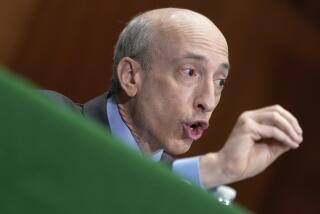Big Board Plans to Allow More Electronic Trading
- Share via
NEW YORK — The New York Stock Exchange said Monday that it would greatly expand its foray into electronic trading, potentially ushering in the most profound change in the market’s 212-year history.
The plan, a bold move that new NYSE Chief Executive John A. Thain has been working on for months, would allow large investors such as mutual funds to conduct far more computerized trading in NYSE-listed shares -- bypassing the human traders who are the heart of the exchange’s operation.
The proposal follows intense criticism by some big investors who say the NYSE’s signature trading system is too slow and costly in an era when investors can swap shares instantaneously on an array of competing all-electronic venues.
By allowing investors to trade more frequently via computers, the plan is a threat to NYSE floor brokers, the intermediaries who have always shepherded trading at the exchange. Currently, only about 10% of NYSE trading volume is entirely electronic.
“This is the most important market-structure change in the history of the exchange,” said William Cline, an electronic-trading expert at Accenture, a consulting firm.
Some floor brokers fear the proposal. But others think it would ultimately mean more business for the NYSE by freeing them to focus on larger and more complex trades, said Doreen Mogavero, chief executive of a floor brokerage firm.
“We really do need to enhance what we do with technology, as has every other industry,” Mogavero said. “It’s proven to be beneficial with other industries and that’s what I think will happen here.”
At its core, Thain’s plan would allow big investors to sacrifice getting the absolute best price for a stock in return for speed of execution, which can be crucial in fast-moving markets.
The plan comes at a critical time for the Big Board, which is trying to mend its image after the pay scandal that ousted its former chief, Richard Grasso, last year, and after a high-profile investigation of improper trading practices of NYSE firms known as specialists.
The proposal, which must be approved by the Securities and Exchange Commission, is a key element of Thain’s strategy to deal with expected regulatory reforms that could harm the NYSE.
The SEC is contemplating changing a trading rule that has had the effect of forcing some business to the NYSE.
Earlier this year, Thain first proposed expanding the exchange’s modest electronic-trading system, known as Direct Plus. That plan called for abolishing the limit of 1,099 shares per electronic trade, which had kept institutions from executing large blocks of stock. It also called for doing away with a 30-second delay between trades.
However, the earlier plan had one significant limitation: Investors would be able to trade electronically only at the best price prevailing at that moment. For example, an investor could press a button to instantly buy an NYSE-listed stock at $20, but could not simultaneously buy other shares at $20.01 or $20.02.
That was a serious shortcoming, critics said, because mutual funds and similar investors trade huge amounts of stock. If only 100 shares were offered at $20, an institutional trader looking to buy 10,000 shares would be helped only minimally.
Big investors asked for the right to automatically “sweep” the book, meaning buy all the shares from $20 up to, say, $20.15, until they traded their full amount. Thain’s latest plan would address that issue -- to a point. Investors could sweep the book within limits of 5 cents to 9 cents a share, depending on the exact price of the stock.
Analysts said the proposal was an attempt to mollify institutional investors while preserving substantial business for the NYSE’s trading firms.
More to Read
Inside the business of entertainment
The Wide Shot brings you news, analysis and insights on everything from streaming wars to production — and what it all means for the future.
You may occasionally receive promotional content from the Los Angeles Times.










